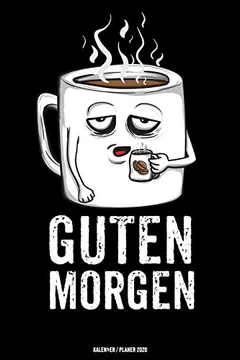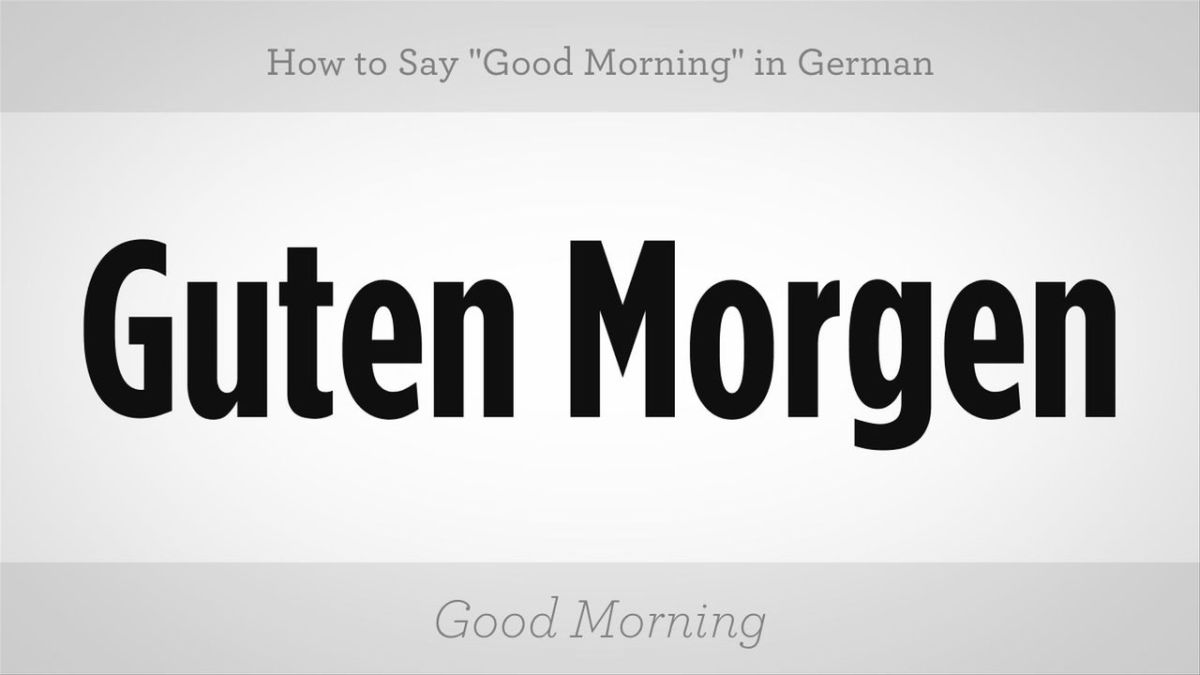Beyond "Guten Morgen": Your Comprehensive Guide To German Greetings
Imagine stepping off a plane in Berlin, Munich, or Hamburg. The air is crisp, the architecture is stunning, and you're ready to immerse yourself in the local culture. What's the first thing you'll want to say to a friendly face? A simple "good morning," of course! While "Guten Morgen" might be the most well-known German equivalent, the world of German greetings is far richer and more nuanced than just one phrase. Learning these simple expressions isn't just about translation; it's about showing respect, building connections, and truly experiencing the warmth of German hospitality. This guide will take you beyond the basics, equipping you with the phrases you need to confidently greet anyone, at any time of day, across Germany and beyond.
Guten Morgen: The Classic Morning Greeting
Let's start with the phrase that likely brought you here: "Guten Morgen." This is the quintessential way to say "good morning" in German, and it's widely understood and used across all German-speaking regions.
- Meaning: Literally translates to "Good Morning."
- Pronunciation: "GOO-ten MOR-gen." The 'G' is hard, like in 'go', and the 'R' is a soft, almost guttural sound from the back of the throat, though a rolled 'R' or even a soft English 'R' is often understood by native speakers.
- Usage: Best used from early morning until around noon. Once the sun is high, Germans typically switch to a more general greeting.
- Formality: "Guten Morgen" is a polite and universally appropriate greeting, suitable for both formal and informal situations. You can use it with strangers, colleagues, friends, and family.
While straightforward, mastering "Guten Morgen" is your first step to unlocking more natural interactions in German.
Expanding Your German Greeting Vocabulary
German greetings are time-sensitive, and knowing which phrase to use at different times of the day is key to sounding natural and polite. Beyond the morning, there are specific greetings for the afternoon, evening, and even regional variations that will make you sound like a local.
Guten Tag: The All-Day Greeting
If you're unsure about the exact time of day or want a versatile greeting, "Guten Tag" is your best friend. It's arguably the most common and widely used greeting in Germany.
- Meaning: "Good Day."
- Pronunciation: "GOO-ten TAHG."
- Usage: This greeting is incredibly flexible and can be used from late morning (around 11 AM or noon) all the way through the afternoon and early evening (up to about 6 PM). It's the default polite greeting when "Guten Morgen" is no longer appropriate and "Guten Abend" is still too early.
- Formality: Like "Guten Morgen," "Guten Tag" is universally polite and appropriate for all situations, from business meetings to casual encounters.
Guten Abend: Welcoming the Evening
As the day winds down and the evening begins, "Guten Abend" becomes the appropriate greeting.
- Meaning: "Good Evening."
- Pronunciation: "GOO-ten AH-bent."
- Usage: Typically used from around 6 PM onwards, or whenever it starts to get dark, until bedtime.
- Formality: This is a polite and standard greeting for evening encounters.
Gute Nacht: Bidding Farewell at Night
This is a crucial distinction: unlike "good morning," "good day," or "good evening," "Gute Nacht" is *not* a greeting. It's a farewell.
- Meaning: "Good Night."
- Pronunciation: "GOO-te NAHKHT." Note the 'e' at the end of 'Gute' instead of 'en' for the other greetings. This is due to grammatical gender agreement, but don't worry too much about the technicalities for now.
- Usage: Used only when you are leaving someone for the night, or when someone is going to bed. You would not say "Gute Nacht" when arriving at a party in the evening.
- Formality: Appropriate for both formal and informal goodbyes before bedtime.
Regional Flavors and Informal Hellos
While the "Guten..." greetings are standard, Germany is a country with diverse regions, and you'll encounter more casual and local ways to say hello.
- Hallo: This is perhaps the most common informal greeting, equivalent to "Hello" in English. It's versatile and can be used at any time of day with friends, family, or people you know well. Pronounced "HAH-lo."
- Moin / Moin Moin: Predominantly used in Northern Germany (e.g., Hamburg, Bremen). It's a very casual, all-day greeting that can mean "hello," "good morning," "good day," or "good evening." It's pronounced "MOYN."
- Servus: Common in Southern Germany (especially Bavaria) and Austria. It's a very friendly and informal greeting that can mean both "hello" and "goodbye." Pronounced "SER-voos."
- Grüß Gott: Literally "Greet God," this is a traditional greeting used primarily in Southern Germany (Bavaria) and Austria, especially in more rural or conservative areas. It's a polite, though somewhat formal, greeting. Pronounced "GROOS GOT."
- Grüezi: If you venture into Switzerland, this is the standard formal greeting, derived from "Grüß dich" (greet you). Pronounced "GROO-et-zee."
The Importance of Authentic Greetings
Why bother learning all these variations? Beyond mere communication, using appropriate German greetings demonstrates a genuine effort to engage with the local culture. It shows respect and can significantly enhance your interactions:
- Cultural Appreciation: Germans value politeness and proper etiquette. Using their greetings correctly shows you've made an effort to understand their customs.
- Building Rapport: A well-placed "Guten Morgen" or "Guten Tag" can open doors, lead to friendlier service, and generally foster positive interactions.
- Enhanced Travel Experience: You'll feel more integrated and less like a tourist. Locals often appreciate it when visitors try to speak their language, even if imperfectly.
- Confidence Boost: Successfully using new phrases in a real-world context is incredibly rewarding and motivates further language learning.
Leveraging Technology for Language Learning
In today's digital age, learning a new language has never been easier. Tools like Google's service, offered free of charge, instantly translates words, phrases, and web pages between English and over 100 other languages. This makes it an invaluable resource for quickly checking pronunciations, understanding nuances, or even translating entire conversations on the fly. Beyond translation tools, there's a wealth of resources at your fingertips:
- Language Learning Apps: Apps like Duolingo, Babbel, and Memrise offer structured lessons and gamified learning experiences that can help you memorize vocabulary and practice pronunciation.
- Online Dictionaries: Websites like Leo.org or dict.cc are excellent for looking up words, checking their gender, and hearing native speaker pronunciations.
- YouTube Tutorials: Many channels offer free German lessons, pronunciation guides, and cultural insights.
- Podcasts and Music: Immerse yourself by listening to German podcasts or music. This helps you get accustomed to the rhythm and intonation of the language.
- Language Exchange Partners: Connect with native German speakers online for real-time conversation practice.
Mastering German Pronunciation
While the grammar of German can be complex, its pronunciation is relatively phonetic, meaning words are generally pronounced as they are written. However, some sounds are unique and require practice:
- Vowels: German vowels can be long or short. For example, 'a' in 'Tag' is long, while 'a' in 'Mann' is short. The umlauts (ä, ö, ü) represent distinct sounds not found in English. 'ä' is like 'e' in 'bed', 'ö' is like 'u' in 'fur' (but with rounded lips), and 'ü' is like 'oo' in 'moon' (but with rounded lips).
- Consonants:
- 'ch': This sound has two main variations. After 'a', 'o', 'u', or 'au', it's a guttural sound like the 'ch' in Scottish 'loch'. After 'e', 'i', 'ä', 'ö', 'ü', 'ei', 'eu', 'ie', it's a softer sound, like a whispered 'h' or the 'h' in 'huge'.
- 'r': Often pronounced as a soft, guttural sound from the back of the throat, or sometimes as a rolled 'r' at the front of the mouth.
- 's': Can be pronounced like 'z' at the beginning of a word (e.g., 'Sonne' - ZOH-ne) or like 's' in 'house' at the end of a word (e.g., 'Haus' - HOWSS).
- 'z': Always pronounced like 'ts' in 'cats'.
- 'v': Often pronounced like 'f' (e.g., 'Vater' - FAH-ter).
- 'w': Always pronounced like 'v' (e.g., 'Wasser' - VAH-ser).
- Stress: In most German words, the stress falls on the first syllable, which can be helpful for pronunciation.
Don't be afraid to sound out words and listen to native speakers. Consistency and practice are your best tools for improving pronunciation.
Conclusion
Learning how to say "good morning" in German is just the beginning of a rewarding linguistic journey. From the classic "Guten Morgen" to the versatile "Guten Tag" and the regional charm of "Moin" or "Servus," each greeting offers a unique window into German culture and communication. By taking the time to learn these phrases, you're not just acquiring vocabulary; you're opening yourself up to richer interactions, showing respect for local customs, and enhancing your overall experience in German-speaking countries. So, go ahead, practice your "Guten Morgen," embrace the "Guten Tag," and confidently greet the world in German!
Summary: This article provides a comprehensive guide to saying "good morning" in German, starting with "Guten Morgen" and expanding to other time-sensitive greetings like "Guten Tag" and "Guten Abend." It clarifies the use of "Gute Nacht" as a farewell and explores various regional and informal greetings such as "Hallo," "Moin," and "Servus." The importance of using authentic greetings for cultural respect and enhanced interactions is highlighted, along with practical tips for pronunciation and leveraging technology, including Google Translate, for language learning. The article encourages readers to embrace German greetings to enrich their travel and communication experiences.

Good Morning in German (Guten Morgen) Images & Wishes - Good Morning

How to Say "Good Morning" in German - Howcast

31 Ways to Say Good Morning in German | FluentU